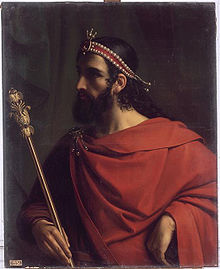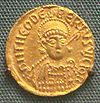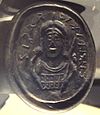- Charibert I
-
Charibert I (c. 517–November or December 567) was the Merovingian King of Paris, the second-eldest son of Chlothar I and Ingund. His elder brother was Gunthar, who died sometime before their father's death.
In 556, Chlothar sent Charibert and his next youngest brother Guntram against their younger brother Chram who was in revolt. Chramn was hiding out on Black Mountain in the Limousin. Negotiations failed and the two armies prepared for battle. A thunderstorm prevented any engagement and Chramn sent forged letters to his brothers, falsely reporting their father's death. Charibert and Guntram immediately returned to Burgundy to secure their positions.
On Chlothar's actual death in 561, the Frankish kingdom was divided between his sons in a new configuration. Each son ruled a distinct realm, which was not necessarily geographically coherent but could contain two unconnected regions, from a chief city after which his kingdom is called. Charibert received Neustria (the region between the Somme and the Loire), Aquitaine, and Novempopulana with Paris as his capital. His chief cities were Rouen, Tours, Poitiers, Limoges, Bordeaux, Toulouse, Cahors, and Albi. Guntram received Burgundy, then Sigebert received Austrasia (including Rheims) with his capital at Metz, and the youngest brother Chilperic received a compact kingdom with Soissons as its capital.
Charibert and his wife Ingoberga had a daughter, Bertha (539–c. 612). Charibert also had several concubines. By Merofleda, a wool-carder's daughter, and her sister Marcovefa, he had daughters: Berteflede (a nun in Tours) and Clothilde (a nun in St. Croix, Poitiers). By Theodogilda (or Theudechild), a cowherd's daughter; Charibert had his only son, who died in infancy. His brutal behavior resulted in his excommunication,[1] the first ever of a Merovingian king.[citation needed]
Charibert was scarcely more than king at Paris when he married his daughter Bertha to Ethelbert, the pagan King of Kent. She took with her Bishop Liudhard as her private confessor. Her influence in the Kentish court was instrumental in the success of St. Augustine of Canterbury's mission in 597.
Though Charibert was eloquent and learned in the law, he was one of the most dissolute of the early Merovingians. He was excommunicated, and his early death in 567 was brought on by his excesses. He was buried in Blavia castellum, a military fort in the Tractatus Armoricani. At his death his brothers divided his realm between them, agreeing at first to hold Paris in common. His surviving queen (out of four), Theudechild, proposed a marriage with Guntram, though a council held at Paris in 557 had outlawed such matches as incestuous. Guntram decided to house her more safely, though unwillingly, in a nunnery at Arles.
The main source for Charibert's life is Gregory of Tours' History of the Franks (Book IV, 3,16,22,26 and IX, 26), and from the English perspective Bede's Ecclesiastic History of the English People.
References
Sources
- Bachrach, Bernard S. Merovingian Military Organization, 481–751. Minneapolis: University of Minnesota Press, 1971.
- Historia Francorum Books I-IX at Medieval Sourcebook.
Charibert IPreceded by
Clotaire IKing of Paris
561–567Succeeded by
PartitionedMerovingian monarchs Childeric I (457–481) • Clovis I (481–511) • Childebert I (511–558) • Chlodomer (511–524) • Theuderic I (511–533) • Theudebert I (533–548) • Theudebald (548–555) • Chlothar I the Old (511–561) • Charibert I (561–567) • Guntram (561–592) • Sigebert I (561–575) • Childebert II (575–595) • Theudebert II (595–612) • Theuderic II (612–613) • Sigebert II (613) • Chilperic I (561–584) • Chlothar II the Great (584–623) • Dagobert I (623–634) • Charibert II (629–632) • Chilperic (632) • Sigebert III (634–656) • Childebert the Adopted (656–661) • Clovis II (639–657) • Chlothar III (657–673) • Childeric II (662–675) • Theuderic III (675–691) • Dagobert II (675–679) • Clovis IV (691–695) • Childebert III the Just (695–711) • Dagobert III (711–715) • Chilperic II (715–721) • Chlothar IV (717–720) • Theuderic IV (721–737) • Childeric III (743–751)Categories:- Merovingian dynasty
- Frankish kings
- 517 births
- 567 deaths
Wikimedia Foundation. 2010.



